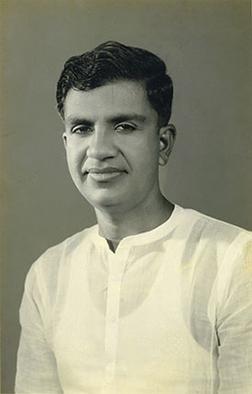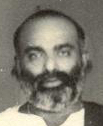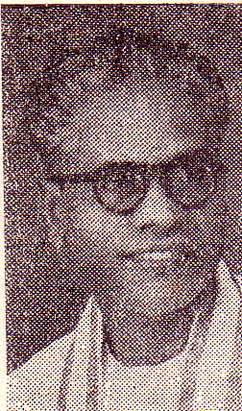Veerasingham Anandasangaree is a Sri Lankan Tamil politician, former Member of Parliament and leader of the Tamil United Liberation Front. He is commonly known as Sangaree. A vocal critic of violence committed by all sides, Sangaree is a supporter of federalism similar to that of India as a solution to Sri Lanka's ethnic conflict.

Murugesu Sivasithamparam was a leading Sri Lankan Tamil politician, Member of Parliament and Deputy Speaker.
Chavakachcheri Electoral District was an electoral district of Sri Lanka between August 1947 and February 1989. The district was named after the town of Chavakachcheri in Jaffna District, Northern Province. Kilinochchi Electoral District was carved out of the southern part of the district in March 1960. The 1978 Constitution of Sri Lanka introduced the proportional representation electoral system for electing members of Parliament. The existing 160 mainly single-member electoral districts were replaced with 22 multi-member electoral districts. Chavakachcheri electoral district was replaced by the Jaffna multi-member electoral district at the 1989 general elections, the first under the PR system, though Chavakachcheri continues to be a polling division of the multi-member electoral district.
Jaffna Electoral District was an electoral district of Sri Lanka between August 1947 and February 1989. The district was named after the city of Jaffna in Jaffna District, Northern Province. The 1978 Constitution of Sri Lanka introduced the proportional representation electoral system for electing members of Parliament. The existing 160 mainly single-member electoral districts were replaced with 22 multi-member electoral districts. Jaffna electoral district was replaced by the Jaffna multi-member electoral district at the 1989 general elections, the first under the PR system, though Jaffna continues to be a polling division of the multi-member electoral district.
Kankesanthurai Electoral District was an electoral district of Sri Lanka between August 1947 and February 1989. The district was named after the town of Kankesanthurai in Jaffna District, Northern Province. The 1978 Constitution of Sri Lanka introduced the proportional representation electoral system for electing members of Parliament. The existing 160 mainly single-member electoral districts were replaced with 22 multi-member electoral districts. Kankesanthurai electoral district was replaced by the Jaffna multi-member electoral district at the 1989 general elections, the first under the PR system, though Kankesanthurai continues to be a polling division of the multi-member electoral district.
Kayts Electoral District was an electoral district of Sri Lanka between August 1947 and February 1989. The district was named after the island of Kayts in Jaffna District, Northern Province. The 1978 Constitution of Sri Lanka introduced the proportional representation electoral system for electing members of Parliament. The existing 160 mainly single-member electoral districts were replaced with 22 multi-member electoral districts. Kayts electoral district was replaced by the Jaffna multi-member electoral district at the 1989 general elections, the first under the PR system, though Kayts continues to be a polling division of the multi-member electoral district.
Kilinochchi Electoral District was an electoral district of Sri Lanka between March 1960 and February 1989. The district was named after the town of Kilinochchi in Kilinochchi District, Northern Province. The district was carved out of the southern part of Chavakacheri Electoral District in March 1960. The 1978 Constitution of Sri Lanka introduced the proportional representation electoral system for electing members of Parliament. The existing 160 mainly single-member electoral districts were replaced with 22 multi-member electoral districts. Kilinochchi electoral district was replaced by the Jaffna multi-member electoral district at the 1989 general elections, the first under the PR system, though Kilinochchi continues to be a polling division of the multi-member electoral district.
Kopay Electoral District was an electoral district of Sri Lanka between August 1947 and February 1989. The district was named after the town of Kopay in Jaffna District, Northern Province. The 1978 Constitution of Sri Lanka introduced the proportional representation electoral system for electing members of Parliament. The existing 160 mainly single-member electoral districts were replaced with 22 multi-member electoral districts. Kopay electoral district was replaced by the Jaffna multi-member electoral district at the 1989 general elections, the first under the PR system, though Kopay continues to be a polling division of the multi-member electoral district.
Mannar Electoral District was an electoral district of Sri Lanka between August 1947 and February 1989. The district was named after the town of Mannar in Mannar District, Northern Province. The 1978 Constitution of Sri Lanka introduced the proportional representation electoral system for electing members of Parliament. The existing 160 mainly single-member electoral districts were replaced with 22 multi-member electoral districts. Mannar electoral district was replaced by the Vanni multi-member electoral district at the 1989 general elections, the first under the PR system, though Mannar continues to be a polling division of the multi-member electoral district.
Nallur Electoral District was an electoral district of Sri Lanka between March 1960 and February 1989. The district was named after the town of Nallur in Jaffna District, Northern Province. The district was carved out of the eastern part of Jaffna Electoral District in March 1960. The 1978 Constitution of Sri Lanka introduced the proportional representation electoral system for electing members of Parliament. The existing 160 mainly single-member electoral districts were replaced with 22 multi-member electoral districts. Nallur electoral district was replaced by the Jaffna multi-member electoral district at the 1989 general elections, the first under the PR system, though Nallur continues to be a polling division of the multi-member electoral district.
Point Pedro Electoral District was an electoral district of Sri Lanka between August 1947 and February 1989. The district was named after the town of Point Pedro in Jaffna District, Northern Province. Udupiddy Electoral District was carved out of the western part of the district in March 1960. The 1978 Constitution of Sri Lanka introduced the proportional representation electoral system for electing members of Parliament. The existing 160 mainly single-member electoral districts were replaced with 22 multi-member electoral districts. Point Pedro electoral district was replaced by the Jaffna multi-member electoral district at the 1989 general elections, the first under the PR system, though Point Pedro continues to be a polling division of the multi-member electoral district.
Udupiddy Electoral District was an electoral district of Sri Lanka between March 1960 and February 1989. The district was named after the town of Udupiddy in Jaffna District, Northern Province. The district was carved out of the western part of Point Pedro Electoral District in March 1960. The 1978 Constitution of Sri Lanka introduced the proportional representation electoral system for electing members of Parliament. The existing 160 mainly single-member electoral districts were replaced with 22 multi-member electoral districts. Udupiddy electoral district was replaced by the Jaffna multi-member electoral district at the 1989 general elections, the first under the PR system, though Udupiddy continues to be a polling division of the multi-member electoral district.
Uduvil Electoral District was an electoral district of Sri Lanka between March 1960 and February 1989. The district was renamed Manipay Electoral District in July 1977. The district was named after the towns of Uduvil and Manipay in Jaffna District, Northern Province. The 1978 Constitution of Sri Lanka introduced the proportional representation electoral system for electing members of Parliament. The existing 160 mainly single-member electoral districts were replaced with 22 multi-member electoral districts. Manipay electoral district was replaced by the Jaffna multi-member electoral district at the 1989 general elections, the first under the PR system, though Manipay continues to be a polling division of the multi-member electoral district.
Vaddukoddai Electoral District was an electoral district of Sri Lanka between August 1947 and February 1989. The district was named after the town of Vaddukoddai in Jaffna District, Northern Province. The 1978 Constitution of Sri Lanka introduced the proportional representation electoral system for electing members of Parliament. The existing 160 mainly single-member electoral districts were replaced with 22 multi-member electoral districts. Vaddukoddai electoral district was replaced by the Jaffna multi-member electoral district at the 1989 general elections, the first under the PR system, though Vaddukoddai continues to be a polling division of the multi-member electoral district.
Batticaloa Electoral District was an electoral district of Sri Lanka between August 1947 and February 1989. The district was named after the city of Batticaloa in Batticaloa District, Eastern Province. The district was a two-member constituency between March 1960 and February 1989. The 1978 Constitution of Sri Lanka introduced the proportional representation electoral system for electing members of Parliament. The existing 160 mainly single-member electoral districts were replaced with 22 multi-member electoral districts. Batticaloa electoral district was replaced by the Batticaloa multi-member electoral district at the 1989 general elections, the first under the PR system, though Batticaloa continues to be a polling division of the multi-member electoral district.
Trincomalee electoral district was an electoral district of Sri Lanka between August 1947 and February 1989. The district was named after the city of Trincomalee in Trincomalee District, Eastern Province. The 1978 Constitution of Sri Lanka introduced the proportional representation electoral system for electing members of Parliament. The existing 160 mainly single-member electoral districts were replaced with 22 multi-member electoral districts. Trincomalee electoral district was replaced by the Trincomalee multi-member electoral district at the 1989 general elections, the first under the PR system, though Trincomalee continues to be a polling division of the multi-member electoral district.

Kathiripillai Thurairatnam was a Sri Lankan Tamil teacher, lawyer, politician and Member of Parliament.

Vallipuram Nallathamby Navaratnam was a Sri Lankan Tamil lawyer, politician and Member of Parliament.

Kaarthigesar Ponnambalam Ratnam was a Sri Lankan Tamil academic, politician and Member of Parliament.

Thamotharampillai Sivasithamparam was a Sri Lankan Tamil politician and Member of Parliament.